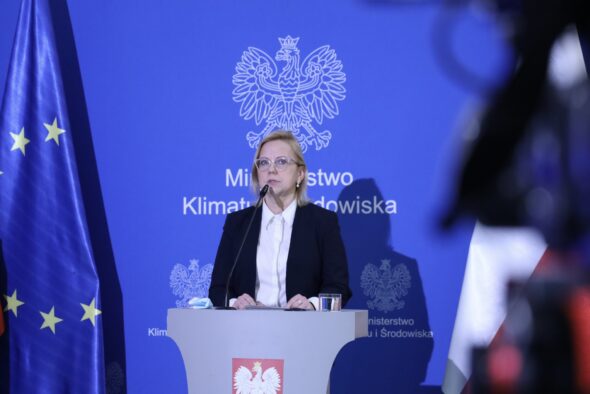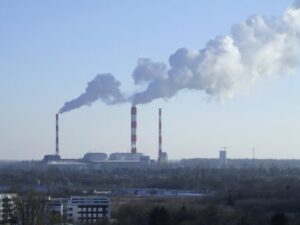„Gas supply to Poland will not be at risk. The situation is volatile but we are prepared for any scenario,” says Minister of Climate and Environment Anna Moskwa in an interview with BiznesAlert.pl.
BiznesAlert.pl: What new solutions will be implemented to handle the energy crisis in Poland and the European Union? How to reduce the impact of the exorbitant prices on the society?
Anna Moskwa: Apart from the diversification of supply and the energy transition, this was one of the topics discussed at the World Economic Forum in Davos. This is the most difficult part of the discussion, also at the European level. Poland was already faced with high prices last year. We have been explaining how much gas prices have been manipulated by Gazprom. ACER and ESMA data from December 2021 clearly show that Algeria and Norway increased their supplies by 25 percent, while Gazprom shipped only as much as it had to under long-term contracts, and filled its warehouses at only 45 percent, which is far below the usual level. We’ve gotten used to this kind of behavior. The government’s anti-inflation shield allowed for tax cuts and provided a protective benefit. We are considering another package of solutions. Among other things, in recent weeks we have launched a program Moje Ciepło (My Warmth) supporting the purchase and installation of heat pumps with a budget of PLN 600 million. At the end of the year the European Commission presented a toolbox. We already have new legislation, but there is still no discussion at EU level. The new instruments are REPowerEU and the Reconstruction Fund.
It has also been proposed to introduce a tax on extraordinary revenues of companies, due to record fuel prices, which, according to the International Energy Agency, would add EUR 200 billion in 2022 to combat the energy crisis. Is that a good idea?
We appreciate the cooperation with the International Energy Agency and its recommendations on savings. These are sensible solutions, regardless of the crisis, and we will implement them. The windfall tax alone does not seem necessary in Poland. We do not host private entities that do not have energy security in statutes, which must be taxed so that the dividend does not run abroad. We have state-owned companies. The IEA welcomes our energy policy with some reservations, which we openly discuss.
Does this mean that Poland does not have to fear a gas supply crisis?
The price of energy in Europe is linked to the price of gas. Poland is safe thanks to contracts for the supply of LNG, which we already have at our disposal, i.e. some 6 billion cubic meters at predictable, fixed prices. From this point of view, we are in a better position than the countries that are now frantically looking for gas agreements outside of Russia.
Will this be enough if the gas from Russia stops flowing to Europe, a scenario for which Austria and Germany are preparing new regulations?
We’re safe. First of all, our gas storage facilities are full. At this moment, they’re 94 percent full. Europe’s gas reserves are at over 30 percent, which is definitely less than in our country. In the worst case scenario, we will tap into our gas reserves in the winter, and soon the connection with Slovakia with a capacity of 5.7 billion cubic meters will be ready. This is an emergency safeguard, more so for the Slovaks. It’s about physical deliveries from the south. PGNiG is in talks on the matter. However, today this direction is not necessary, because we have contracts for Świnoujście and Klaipeda, as well as, for now, the German exchange. We have prepared various contingency scenarios after the war broke out, including one that involves the complete cessation of supplies from Russia, assuming, of course, that the Baltic Pipe is launched, and there is no reason to say this will not happen this fall. The supply for this year has been already ensured. Six billion cubic meters is a yearly capacity, but in the last quarter, the maximum amount we will receive is a third of that amount, which we might not need. Only about 2-4 billion cubic meters will be available. This year we will need about 1 bcm from the Baltic Pipe, provided we will use up the reserves and we will have access to the German exchange. In my opinion, Poland is not at risk of being deprived of gas supply. However, the situation is volatile and we are prepared for any scenario. We have regulations and contingency plans in place in the event of a crisis, because every country has one. Many countries are already introducing them as a preventive measure. We are not doing this, because we don’t have to. An extreme scenario like a lack of supply through the Baltic Pipe, a lack of supply through Lithuania, through Slovakia, can always happen, even without a war. At this point such a risk does not exist, otherwise we would have already reported on this. These preparations are made just in case. Until now, it was not necessary to use these solutions, it is a completely new situation.
Will the Czech Republic and Slovakia import gas through Poland?
We’re talking to them about plans for the future. All of Europe wants to abandon gas from Russia. Connections between our countries will not be enough to supply the Czech and Slovak markets. Our gas transmission operators are talking about this. Both countries are interested in the FSRU in the Gdańsk Bay. There are various options to consider. We are planning the FSRU with a capacity of 6 billion cubic meters, but we can always buy another one. In such a case two vessels would have to be paid for, but the quay and breakwater would be already there. But that would be the responsibility of our neighbors. We’d like to include the FSRU in the REPowerEU. It remains to be decided whether it will be of 6 or 12 bcm capacity, depending on the interest of the neighbors. It is also a question of expanding the existing and building new transmission channels, which our southern partners would need. We are ready to help countries without access to the sea.
Could Ukraine also count on more LNG from Poland?
I am in touch with Energy Minister German Galushchenko about this issue. In Ukraine gas plays a small role. Kyiv finds it difficult to estimate the demand after the war, when the country will be rebuilt. One of the scenarios is to use the FSRU. Ukraine has provided a few variants of initial scenarios. Much depends on the future of Odessa. We are firmly convinced of Ukraine’s territorial integrity and access to the sea. We are preparing for a scenario in which this integrity is preserved.
Would you like to trade energy with Ukraine?
The Polish Institute of Energy in Gdańsk has big hopes about the energy demand by the Dnieper. It was also involved in the preparation of the synchronization. Different variants are taken into consideration, including exporting energy to Ukraine. We have the Chmielnicki-Rzeszów connection, which is currently unused. We are interested in cooperation, as is the Ukrainian side. We are talking about selling energy from Ukraine to Poland, which will support our stability, and will allow them to take advantage of the existing synchronization. They’re already part of the continental system. Poland also wants to introduce Ukraine to the International Energy Agency at the next meeting in Paris. For starters, we’d like Ukraine to be an observer. We already have the support of the head of the IEA. This is important for Ukraine, because it is a question of transparency, credibility, solidarity. Importantly, the IEA allows non-European countries to contribute and offer a different perspective. Not necessarily all countries in the world see the same Russian threat, and this was clearly visible in Davos. Some recognize the war in Ukraine as a local conflict. This thinking is very dangerous, because Russia has energy impact all over the world and can also be a threat outside of Europe. We show precisely the consequences of cooperation with Gazprom and more.
What other Polish investments in Ukraine are on the table?
The Minister of Energy of Ukraine declared that for him it was obvious that Polish companies would take part in the reconstruction of the energy sector after the war. This is already happening to some extent. If because of the war, Ukrainian companies have problems, the Ministry of Climate and Environment coordinates cooperation with our companies that help, even by sending cables of certain length. We want to be involved in the reconstruction of Ukraine. Not only buildings are destroyed, but also power lines. Bucha or Irpien are suburbs – like Piaseczno near Warsaw, which have been completely destroyed. Interestingly, although little time has passed since their liberation, the infrastructure is already beginning to be rebuilt. However, the destruction of the Kremenchuk refinery is a whole different case.
Is Poland sending fuel over the Dnieper?
At the beginning of the war and after the bombing of the refinery, we sent fuel free of charge. Currently, Orlen is providing commercial deliveries, which require huge logistical engagement. Usually, these deliveries go through pipelines, so we had to start new supply channels. We provide them on an ongoing basis, maintaining the priority of supplying the Polish market. Fuel companies in Ukraine are doing well. Our supply is a response to the crisis, but the sector is well organized, so it’s hard to see this market’s potential. In addition, we are merging Orlen and Lotos, so we do not want the announcements of further expansion to upset this process. We’re in the final stages of approving countermeasures. The final talks with the European Commission have been completed. I think it’s a matter of months.
Does this process affect the country’s energy security in the face of Russia’s attack on Ukraine?
Ultimately, it will have a big impact. We have a competitive advantage thanks to our new large partner – Saudi Aramco, diversification and preparing our refinery to process oil other than Russian. We are able to easily process several types of oil, and even send some of it to Germany. This cooperation is already in place at a time when other countries are just negotiating such supplies. The merger has prepared us for diversification.
Is Poland trying to persuade Hungary to agree to an oil embargo? Will our special relationship convince them?
We had a lot of technical talks in Poland and Hungary. We showed ready-made models on becoming independent from oil from Russia. Hungarians argue that this is not possible, but we have shown that it is a simple exercise, similar to what Poland has done. Hungarians, too, have long hesitated about the synchronization of Ukraine. There are no technical or resource obstacles. The infrastructure in the south is well organized. However, our conversations ended in nothing, but we tried. The Czech Republic and Slovakia also have doubts, but they do not want money, but transitional periods. The final draft on this issue has been already presented to the Council of the European Union.
Do you know how to finance these changes?
The new proposal of the European Commission assumes that the EU ETS will finance the departure from Russia’s oil and other fuels. Member states would benefit from additional allowances from the market stability reserve (MSR) of 200-250 million worth EUR 20 billion. This idea can be interpreted in different ways. There have been no conversations on this subject at any level. Our analyses show that Poland has a share in this mechanism reaching 11 percent. Meanwhile, Poland would have 7 percent from the Recovery Package, while Spain – 20 percent, Italy – 17 percent, and France similarly. It would then turn out that we would still be a net payer with deficits in the ETS. Since we have problems because we are a payer in the EU ETS, we would contribute to diversification efforts in other states. This solution has been criticized by the Greens, because the CO2 allowances prices dropped, but we are also criticizing it, because the idea to tax hydrocarbons from Russia is more just. Hungarians say that they cannot abandon oil from Russia, so they demand money to pay for this change, and in the meantime they want a transitional period that allows them to continue to buy Russian raw materials. They would still be in a better position in the market, and in addition they would receive extra support without any sacrifices. When it comes to decarbonization, no one asked us if we had the financial and technological wherewithal. We have to execute the plan and there is no discussion of a transition period. At the moment, independence from Russia is much more important than decarbonization, bearing in mind the importance of the latter problem.
Is there any chance that an agreement on this matter will be reached?
The debate on this will be very contentious. We’ve come to a conclusive conversation. The Slovaks proposed a 45 percent tax on the purchase of hydrocarbons. Such a mechanism, or a similar one, like the so-called Russian ETS, would at least level the differences and mobilize us to make changes. Hungarians, so far, are silent about this mechanism. Some countries are spinning a narrative where they regret the fact that they depend on Russia, but they are still unable to reflect on how they found themselves in this situation by not decreasing their dependence for years. Responsibility for this state of affairs cannot be avoided.
Will Poland use the money from the National Recovery Plan to reconcile security and climate protection considerations? Will our plans be revised after Russia’s attack on Ukraine?
It should be noted that the main objective of the National Recovery Plan, which is the basis for spending under the Recovery and Resilience Facility, was to rebuild the economies of EU countries in the wake of the COVID-19 pandemic. This instrument was also intended to ensure that the society was more sustainable and better prepared for the challenges and opportunities of the green and digital transformation. This is reflected in climate spending, which in the National Recovery Plan must be at the level of at least 37 percent. In this context, it may be recalled that the priority of energy security in the new EU programmes has been largely overlooked. At the initial stages of negotiations, when Poland wanted to include in the Plan support for gas infrastructure, this was ruled out in advance.
We are currently analyzing a new legislative proposal from the European Commission under the so-called REpowerEU in terms of amending the regulation, allowing revision of the National Recovery Plans, in connection with the war in Ukraine. We believe that additional EU measures are necessary to meet the significant challenges of an accelerated shift away from imports of Russian fossil fuels. In this context, the indicated directions within REPowerEU, e.g. concerning investments aimed at improving energy infrastructure, are seen as a step in the right direction. It should be possible to revise if the reconstruction plans of individual member states take energy security into account.
Does the dispute over payments for gas in rubles divide the EU countries?
This was also among the important topics in Davos. We are talking about sanctions today, we will continue to talk a month, or a year from now. It seems some countries believe they can decide when to stop gas supplies from Russia, because they have long-term contracts and can complain to arbitration. The cases of Bulgaria, Poland and Finland cut off from deliveries from Russia despite a contract paint a different picture. Another example is what Gazprom did last fall. It did not fill the gas storage facilities before the winter, but the EC is still unable to determine whether it abused its market position. The European Commission has blurred the interpretation of the mechanism of payment in rubles. We do not know what offer each company ultimately received under the decree. Some argue that it’s just about opening an additional account. However, the decree of Vladimir Putin clearly states that this is also a ruble account, and therefore the payment is recognized after the currency is exchanged. This means the payment is made in rubles. The Russians cleverly invented this mechanism, causing a split in the European Union. There is no guarantee that the Russians will not reveal who cooperates with them. We regretted that Gazprom’s European customers did not show these offers, so that we could respond to blackmail together. It is not known whether any annexes or other legal steps were signed. If this was just a debate about rubles, then one could follow Poland’s example and not open an account in Gazprombank. We are not subject to Russian law, and Putin’s decree is not part of the agreement. We are monitoring this situation and we hope for full solidarity within the EU, because a lot depends on the European Commission. For us, it is obvious that payments in rubles are a violation of sanctions, the spirit of which assumed that there would be no new transactions using this currency.
Do we have time to talk?
No. The European Council is coming and the conversations will definitely be heated.
Interview by Wojciech Jakóbik









